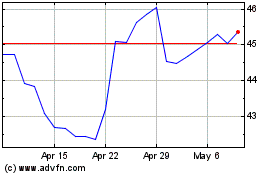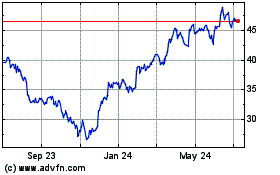Fiat Chrysler-Peugeot Merger Faces a Rocky Road to Success -- 2nd Update
October 31 2019 - 5:52PM
Dow Jones News
By Eric Sylvers
MILAN -- Fiat Chrysler Automobiles NV and Peugeot maker PSA
Group unveiled their $50 billion merger on Thursday. Making it work
in an industry littered with unsuccessful mergers will be the hard
part.
The companies are betting that more heft will boost
profitability, which has long been low in the industry. Auto makers
often invest billions of dollars in their operations, only to earn
modest amounts on each vehicle.
Many companies have tried the merger route only to have the deal
blow up, with Daimler AG's unsuccessful purchase of Chrysler one of
the more striking examples. Recent successful deals include
Peugeot's acquisition of General Motor Co.'s European car business
in 2017 and Fiat's takeover of Chrysler, which began in 2009 and
took several years to complete.
Under the deal announced Thursday, which confirmed a Wednesday
report by The Wall Street Journal, the shareholders of each company
will own 50% of the new entity. Fiat Chrysler's John Elkann, the
head of the Agnelli family, which controls the Italian-American
auto maker, will retain his role as chairman. Peugeot Chief
Executive Carlos Tavares will be CEO.
To make the deal work, Mr. Tavares will have to solve a host of
problems at Fiat Chrysler that include an aging model lineup, a
lack of investment in new technologies and a dependence on one
region, North America. On Thursday, Fiat Chrysler reported
third-quarter results that showed strong profit in North America
and losses in most of the rest of the world.
Fiat Chrysler and Peugeot have failed in efforts to build a
successful business in China.
Mr. Tavares will face the challenge of delivering EUR3.7 billion
($4.1 billion) in annual savings. The companies said they would
achieve them principally from a more efficient allocation of
resources and improved purchasing agreements with suppliers.
"Great on a spreadsheet, but tricky to execute," Jefferies
analyst Philippe Houchois wrote about a potential Fiat
Chrysler-Peugeot deal before the announcement. He nevertheless
called the logic underpinning the deal "overwhelming."
A significant issue Mr. Tavares will confront is Fiat Chrysler's
excess production capacity in Europe, a problem the
Italian-American company's late former CEO, Sergio Marchionne,
tried to address but never solved.
Fiat Chrysler's Italian factories ran at 57% capacity last year,
compared with 88% in the U.S., according to LMC Automotive.
In the face of fierce political opposition, Mr. Marchionne, who
died last year, closed a relatively small Italian factory. Instead
of further closures, he relied -- as many large Italian companies
do -- on temporary layoff plans largely paid for by the
government.
While Italian labor unions have lost some clout over the years,
including in their battles with Mr. Marchionne, they remain
powerful. On Wednesday, a union leader said any deal must guarantee
"full employment and full use of Italian factories."
Fiat Chrysler and Peugeot, which together produced 8.7 million
vehicles last year to put them in third place among the world's
auto makers, said the projected savings won't result from any
factory closings. They estimate 80% of those savings will be
realized after four years and that there will be a one-time cost of
EUR2.8 billion.
The auto makers didn't say what they intended to name the new
company.
Both car makers have sizable market shares in Europe, which
provides the opportunity for cost cutting, but also makes the
capacity-utilization issue more pressing. Together, Fiat Chrysler
and Peugeot have a market share of about 23% in the region, just
behind Volkswagen AG.
Fiat Chrysler's Milan-traded shares rose 8.2% on Thursday, while
Peugeot's stock sank 13%, indicating investors in the
Italian-American car maker were perceived to have gotten the better
deal. Fiat Chrysler shares had already jumped 9.5% on Wednesday,
after the Journal first reported the companies were in talks.
Peugeot shares had risen 4.5% on Wednesday.
Fiat Chrysler shares were buoyed by a EUR5.5 billion special
dividend that the company will pay to its shareholders before the
deal. The arrival of Mr. Tavares, considered a turnaround
specialist, might have also contributed to the rise.
"It's not hard to understand this reaction when you consider the
job done by Peugeot management over the last five years, while Fiat
Chrysler management have overseen a tired product line and little
in the way of innovation," CMC Markets analyst Michael Hewson
wrote.
Mediobanca and Morgan Stanley advised PSA on the deal, Goldman
Sachs and d'Angelin advised Fiat Chrysler and Lazard advised Exor
NV, the Agnelli family holding company that controls Fiat Chrysler.
Zaoui advised the Peugeot family and Perella Weinberg advised PSA's
board.
--
Ben Dummett and Nick Kostov contributed to this article.
Write to Eric Sylvers at eric.sylvers@wsj.com
(END) Dow Jones Newswires
October 31, 2019 17:37 ET (21:37 GMT)
Copyright (c) 2019 Dow Jones & Company, Inc.
General Motors (NYSE:GM)
Historical Stock Chart
From Mar 2024 to Apr 2024

General Motors (NYSE:GM)
Historical Stock Chart
From Apr 2023 to Apr 2024
